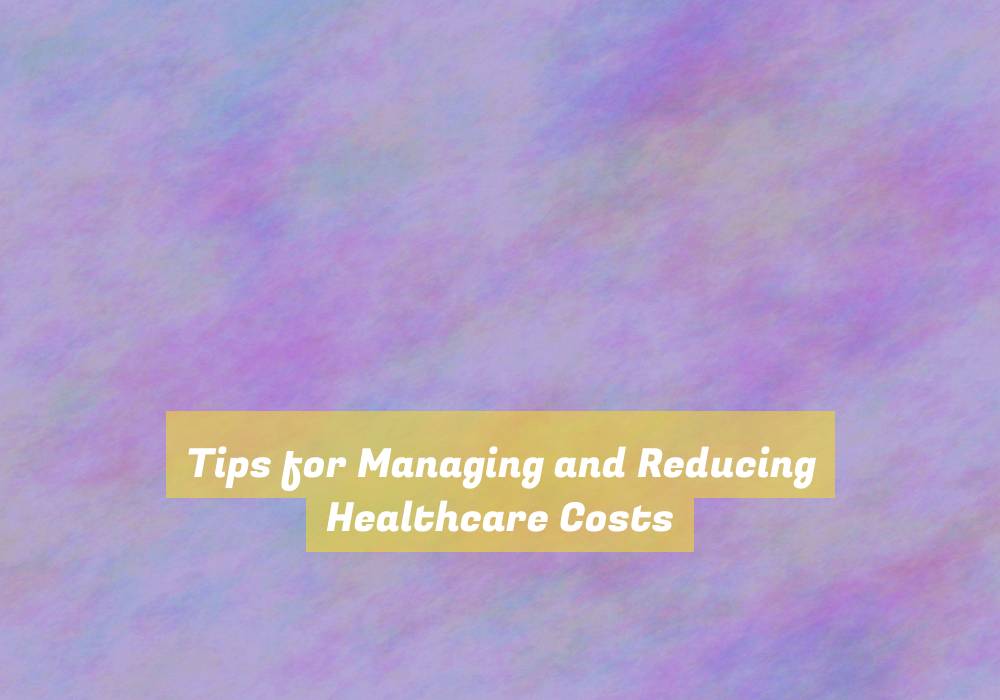Tips for Managing and Reducing Healthcare Costs
Struggling to manage and reduce healthcare costs can feel like an impossible feat, especially as medical expenses continue to rise. But fear not, there are practical strategies you can implement to take control of your healthcare spending.
From understanding your insurance coverage to exploring generic medication options, these tips can help you navigate the complex world of healthcare expenses and potentially save you a significant amount of money.
So, if youG??re ready to take charge of your healthcare costs and ease the financial burden, letG??s explore some effective approaches that can make a real difference in your wallet.
Understanding Your Insurance Coverage
Understanding your insurance coverage is essential for managing healthcare costs effectively. Start by reviewing your policy to understand what services and treatments are covered. Pay attention to details such as deductibles, copayments, and coinsurance, as these can significantly impact your out-of-pocket expenses.
Familiarize yourself with any limitations or exclusions in your coverage, and be aware of any pre-authorization requirements for certain procedures or medications. ItG??s also crucial to know which healthcare providers are in-network, as using out-of-network providers may result in higher costs.
Take the time to understand the terms and conditions of your insurance plan, including any annual or lifetime limits on coverage. Being well-informed about your insurance coverage can help you make informed decisions about your healthcare and avoid unexpected financial burdens.
If you have any questions or concerns about your policy, donG??t hesitate to reach out to your insurance provider for clarification. By understanding your insurance coverage, you can take proactive steps to manage and reduce your healthcare costs.
Exploring Generic Medication Options
Are you aware of the potential cost savings and benefits of exploring generic medication options for your healthcare needs?
Choosing generic medications over brand-name drugs can significantly reduce your out-of-pocket expenses and overall healthcare costs. Generic drugs are required by the FDA to have the same active ingredients, strength, dosage form, and route of administration as their brand-name counterparts. They undergo rigorous testing to ensure theyG??re as safe and effective as the original medications. By opting for generics, you can save money without compromising on quality.
When discussing treatment options with your healthcare provider, inquire about generic alternatives. Many common conditions, such as high blood pressure, diabetes, and allergies, have a wide range of generic medication options available. By choosing generics, you contribute to lowering healthcare costs for both yourself and the healthcare system as a whole.
ItG??s important to note that while generic medications offer cost savings, they may not be available for every prescription. Your healthcare provider can help determine when generic options are appropriate for your specific healthcare needs. Taking advantage of generic medications when possible is a proactive way to manage and reduce your healthcare expenses.
Utilizing Preventive Care Services
Consider scheduling regular check-ups and screenings to proactively monitor your health and prevent potential medical issues.
Preventive care services can help detect health concerns early, allowing for timely intervention and potentially reducing long-term healthcare costs. Many health insurance plans cover preventive services such as vaccinations, screenings for conditions like high blood pressure or diabetes, counseling for maintaining a healthy lifestyle, and more. By taking advantage of these services, you can stay informed about your health status and take proactive steps to maintain or improve it.
Additionally, preventive care can help you avoid the development of more serious and costly health conditions. For example, regular dental check-ups can prevent the progression of oral health issues that may require expensive treatments in the future. Similarly, routine screenings for conditions such as cancer can lead to early detection and better treatment outcomes, potentially reducing the financial burden associated with advanced stages of the disease.
Making preventive care a priority can contribute to long-term cost savings by minimizing the need for extensive medical interventions and treatments. By staying proactive about your health, you can work towards reducing the overall healthcare expenses for you and your family.
Negotiating Medical Bills
To further manage your healthcare costs, explore the option of negotiating your medical bills to potentially reduce your financial burden.
When faced with medical bills that seem overwhelming, donG??t hesitate to reach out to your healthcare provider or the billing department to discuss your situation. Start by reviewing your bills in detail and identifying any potential errors or charges that seem unreasonable.
Once you have a clear understanding of the charges, contact the billing department to inquire about the possibility of negotiating a lower rate or setting up a manageable payment plan. Many healthcare providers are willing to work with patients to find a solution that suits their financial circumstances.
Be prepared to explain your situation and provide any relevant documentation to support your request. Keep the lines of communication open and be persistent in seeking a resolution that aligns with your financial capabilities.
Conclusion
So, by understanding your insurance, exploring generic options, utilizing preventive care, and negotiating bills, you can effectively manage and reduce your healthcare costs.
ItG??s important to take control of your healthcare expenses and make informed decisions to save money.
With these tips, you can work towards better managing and reducing your healthcare costs.







